This article runs in a new section of The Tyee called ‘What Works: The Business of a Healthy Bioregion,’ where you’ll find profiles of people creating the low-carbon, regenerative economy we need from Alaska to central California. Find out more about this project and its funders, Magic Canoe and the Salmon Nation Trust.
Question for beer drinkers: Have you ever wondered how far that beer traveled to get into your pint glass?
If you’re drinking a Peninsula Lager from Small Gods Brewing Co. in Sidney, B.C., no part of your beer has ever left the Saanich Peninsula.
That’s because every ingredient in the crisp, light lager was produced and purchased on this 33-kilometer stretch of land just north of Victoria — and it’s only available to buy here.
“We obviously do very much care about our environmental impact, and we knew that was an interesting way to add another locally sourced beer to our portfolio,” Christopher Bjerrisgaard, head of commercialization for Small Gods, told The Tyee.
Bjerrisgaard co-owns the brewery with his wife, Sierra Skye Gemma, and Small Gods’ head brewer, Jonny Kostiuk.
Keeping the lager’s availability limited to the peninsula cuts down on advertising, distribution, and shipping costs, which helps keep the beer affordable, Bjerrisgaard says.
“Which makes it more appealing to our local community pubs and restaurants, [to] say to them, ‘What if we came to you with a product that’s a closed-loop, peninsula product you can be proud of, is a great story to tell, is cost competitive with larger breweries?’”
When The Tyee visited the Small Gods Brewing Co. taproom in late March, Peninsula Lager had been available for only about a month and a half.
So far, it’s selling well.
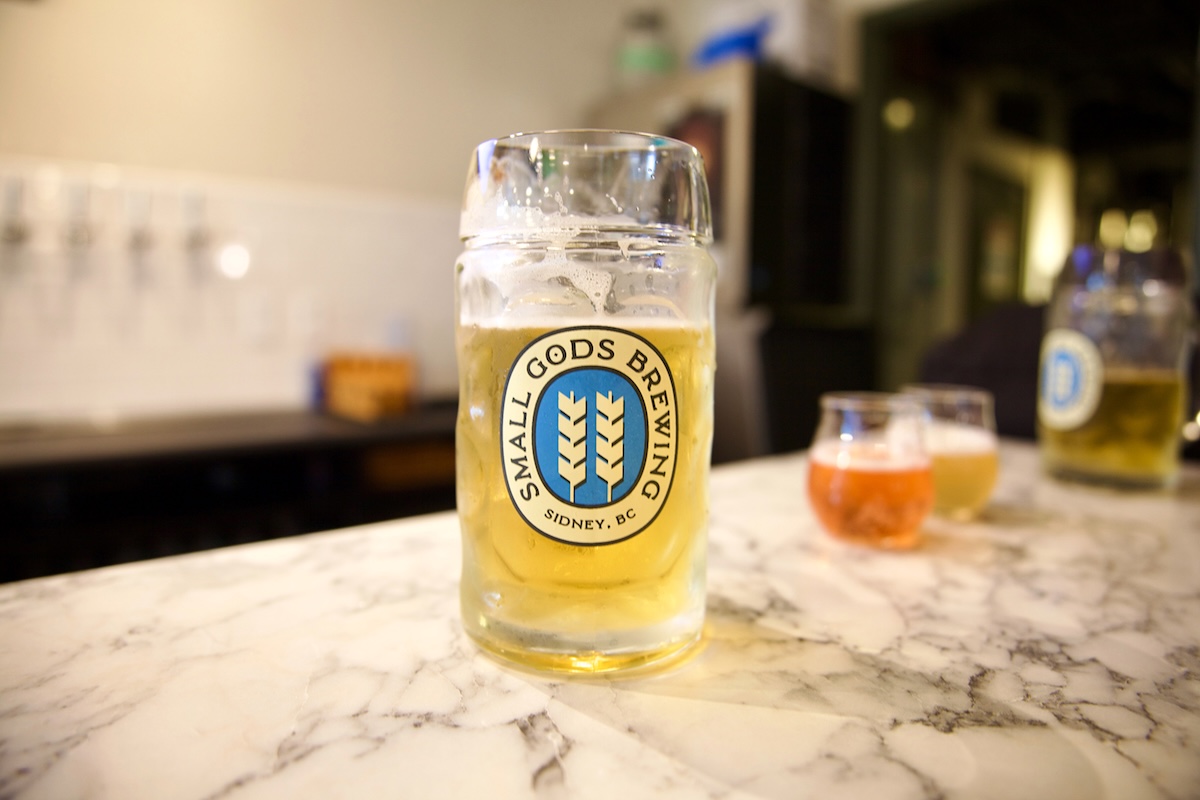
Outside the taproom, Peninsula Lager is available at Sidney pubs and restaurants such as the Surly Mermaid, Jacks on the Water, 10 Acres at the Pier, Mary’s Bleue Moon Café, and the Brentwood Bay Resort. It’s coming this month in cans to local liquor stores north of Keating Cross.
Small Gods’ three main or “core” beers — Promised Land Hazy Pale Ale, Neverending German Pilsner, and, their most popular beer, Rascal King Hazy IPA — are made with some local ingredients, too, such as the barley malt they buy from Field Five Farm in Saanichton.
Their seasonal and smaller-batch beers also contain local ingredients. Elbow Room Peach Tea Gose, for example, is a 100 per cent B.C.-sourced beer with barley malt from Field Five Farm, hops from local suppliers, peach purée from Pacific Coast Fruit Products in Abbotsford, peach rooibos tea from Sidney-based Janet’s Special Teas, and salt from Saltspring Island.
All beers considered, Small Gods Brewing Co. sold just over 180,000 liters of beer in 2024. This year Bjerrisgaard predicts they will top out at about 200,000 liters, just 10,000 liters below their maximum capacity.
Small Gods Brewing Co. had been Bjerrisgaard’s dream for years when it finally opened in August 2022. It was important for him that the small craft brewery fit into the community organically.
Not just in the size and aesthetic of their taproom, but in the ingredients from B.C. and Canadian farmers, and the monthly events — a book club, a writers’ group, a run club, a knitting group.
Small Gods Brewing Co. is also rooted in a firm and intentional commitment to diversity, inclusion, and equity in both how they hire and the customers they encourage through the door. For example, they are big supporters of Good Night Out, a non-profit that promotes safety from sexual assault in the bar scene, donating $2 from every beer sold during their annual Collab Fest.
Small Gods also promotes customer safety through their own code of conduct, printed on every menu, that includes zero tolerance for harassment, bullying or discrimination.
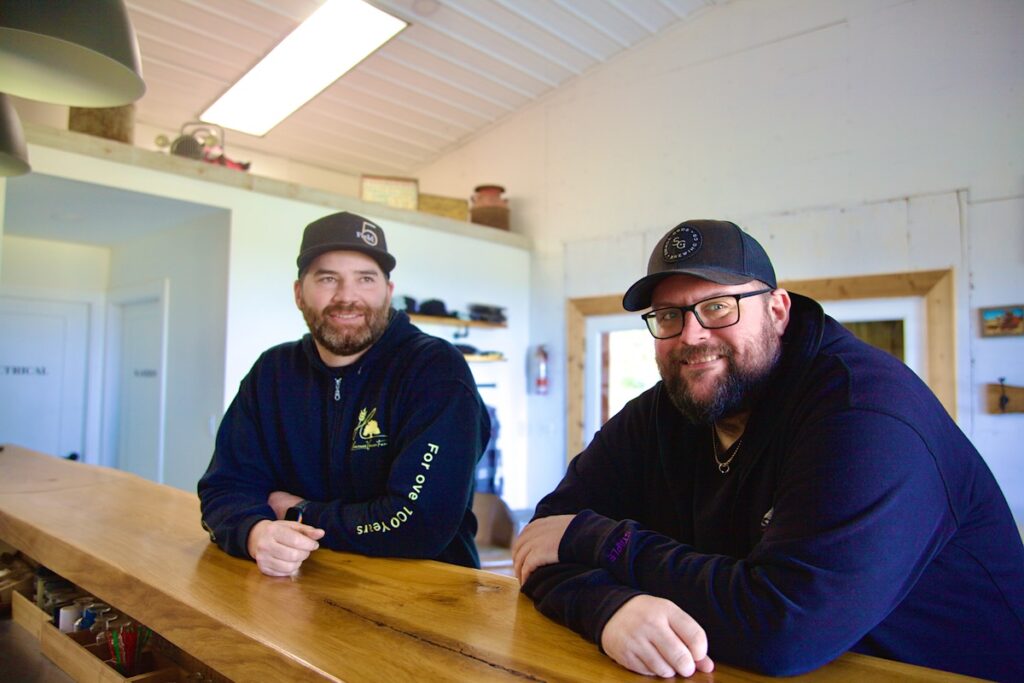
It fit Bjerrisgaard’s vision. And it made financial sense, too, he says.
“I saw some of the indicators that if you found the right location, you became community focused, you did some unique approaches to how you did this business, that there was still space in this industry for new brands.”
A pandemic-related layoff from his marketing job at another craft brewery proved to be the opening Bjerrisgaard needed to start making Small Gods a reality.
Prior to that gig, Bjerrisgaard worked in marketing at Parallel 49 and at Central City Brewers & Distillers in Surrey before either got big.
“I enjoyed my time more when we were smaller and scrappier than when we were larger and harder to spin on a dime and do something fun and interesting,” he says.
Beer for bibliophiles
Almost 30 years ago Sidney, located on W̱SÁNEĆ First Nations territory on the southeast coast of Vancouver Island, declared itself Canada’s first “Booktown.” It boasted nine bookstores at its peak, in a town of just over 10,000 people.
While Sidney’s population has grown to about 12,000 today, the bookstore count has dwindled to two: Tanner’s Books and the Haunted Bookshop.
But Sidney’s bibliophile reputation lives on, including in the name Small Gods Brewing Co., a reference to In Search of Small Gods, a poetry book featuring a poem of the same name, by Jim Harrison.
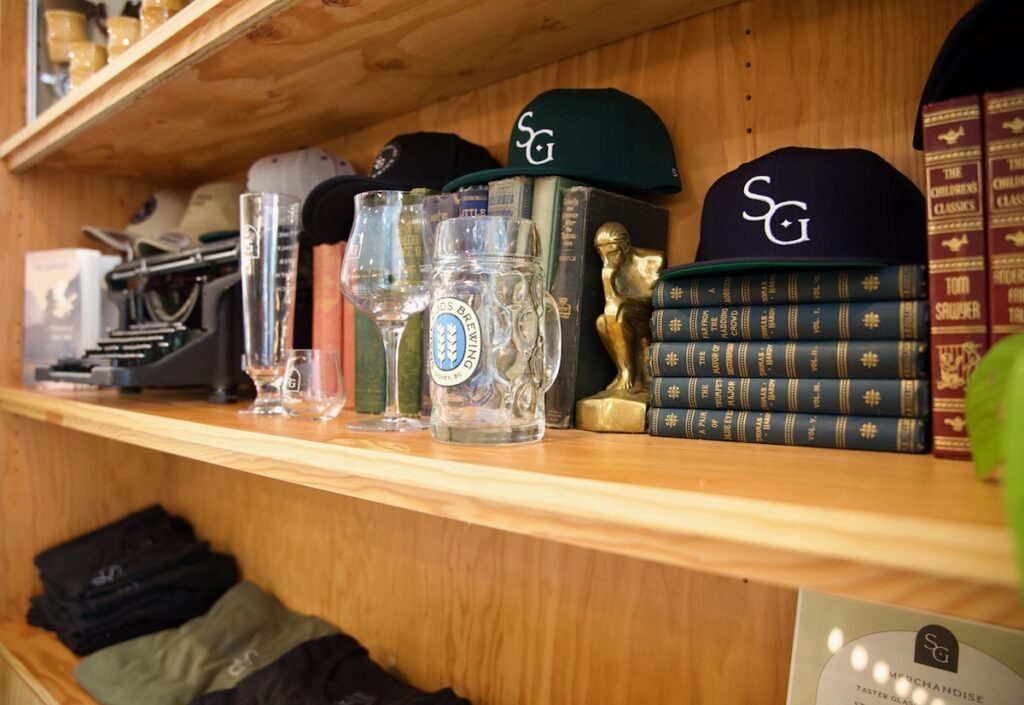
Best known for writing the novella Legends of the Fall, Harrison was less known, but more relevant to Small Gods’ founders, for his output of food- and drink-themed literature.
“He encompassed our three tenets of the business, which are food, drink, and literature,” Bjerrisgaard says.
The phrase “small gods” has a connection to 15th-century German beer production too.
The word that German brewers used to describe the foamy head of a beer roughly translates to “God is good,” because at the time they believed successfully fermented beer was divine intervention, Bjerrisgaard says.
Small Gods co-owner Sierra Skye Gemma is also a celebrated B.C. author, cementing the decision to make it a literary-themed craft brewery.
That includes the names of the beers, the taproom decor with shelves of books and antique typewriters, and literary-themed events like book launches and book swaps.
The taproom’s vibe is “community living room,” Bjerrisgaard says — though without a TV. Books for kids and board games for everyone offer customers on-theme entertainment. Children are welcome until 9 p.m.
“We’re trying to do things that put us beyond just a place to consume delicious craft beer,” Bjerrisgaard says.
“We want families to be able to feel like they can come in here, entertain their kids, have a breather from life and have a beer.”
Local sustainability
In addition to their core beers, Small Gods Brewing Co. brews seasonal beers and a “new” beer every week on a six-week rotating schedule. Roughly 40 per cent are returning favourites from previous years. In total the craft brewery makes upwards of 55 different beer varieties every year.
This includes the six to seven beers Small Gods collaborates on annually with other breweries, restaurants, and even non-hospitality businesses like a boxing gym.
When The Tyee visited the taproom in March, Monsters Like Us Double Dry Hopped Farmhouse Ale, a collaboration with Powell Brewery, had just released that week.
The idea, Bjerrisgaard says, is to brew high-quality beers in an ecologically sustainable way.
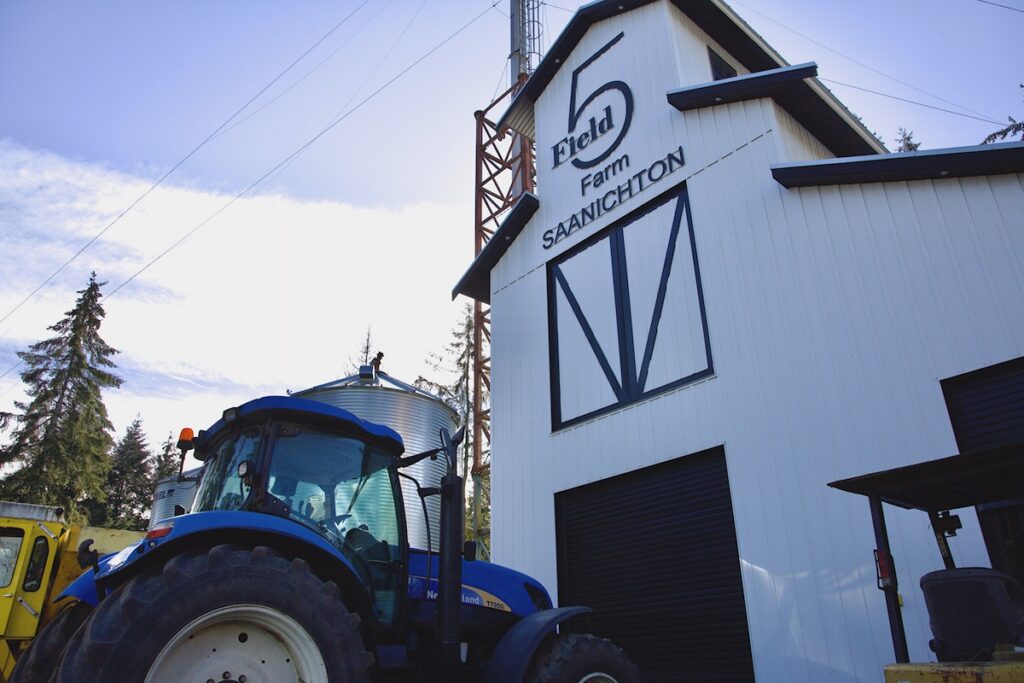
Both are reasons why Small Gods has built a relationship with Field Five Farm, located about nine kilometers south of the brewery.
“They have the same moral ethics as us, which is local, sustainable, good products,” says Kyle Michell, chief operating officer and maltster of Field Five Farms, about their relationship with Small Gods Brewing Co.
Field Five grows grains such as barley and wheat, and malts their crops on site.
“As we learned in 2020, a lot of breweries were sourcing their specialty grains from Europe, and that all came crashing down,” says Michell, a sixth-generation farmer.
The U.S. tariffs magnify the need for Canadian producers, he added. “You can see now how vital it is to have something local.”
Spent grain left over from Small Gods’ brewing process goes to other peninsula farms to be used either in feed for livestock or as compost.
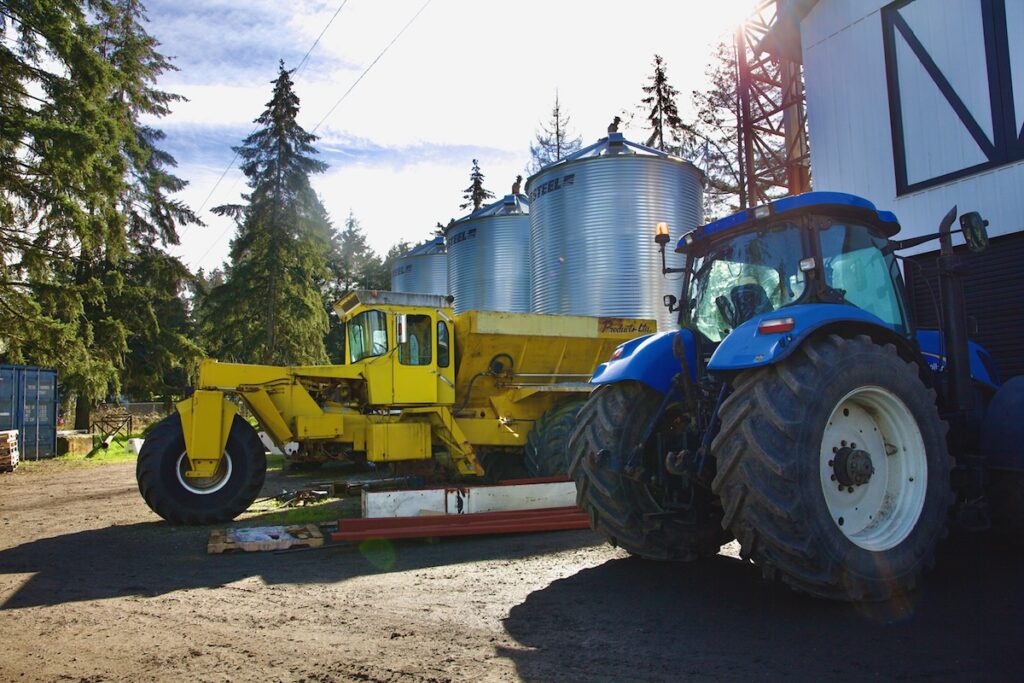
All the vegetable scraps produced in the taproom’s kitchen are used to make soup stock.
Leftover bread becomes crumbs for their meatballs, which also include the ground-up heels of all the deli meats. Cheese heels go into the beer cheese sauce for their soft pretzels, the taproom’s best-selling snack.
It’s not always possible to go local, however.
Ingredients like specialty hops with proprietary strains are shipped from outside the country, and Small Gods gets some of their meats and cheeses from Italy through a local supplier.
Emphasizing care in community
Small Gods Brewing Co. employs anywhere from 16 to 25 people, depending on the season.
Base pay is above minimum wage, and tips top up the wages paid to the living-wage level, Bjerrisgaard says.
“We have never had a scenario where a team member has made under a living wage when you include the tips,” he says.
Training taproom employees usually takes about a month, because there isn’t any separation between kitchen, till, and bar staff.
“You first learn how to do the deli and deli assembly, and then you learn how to do the till and then the bar,” Bjerrisgaard says, adding that everyone working the taproom is included in the tip pool.
“And everybody runs, buses, does dishes. We try to keep it as a very team environment, and that way we are able to make sure that the people we have are getting reasonable hours.”
Staff are paid a reasonable wage, take breaks and get paid vacation and sick days without question, Bjerrisgaard says, and the majority of people on staff receive benefits.
Small Gods aims to make their taproom a safe, respectful space for staff and customers alike. Their code of conduct is printed out on their menus — a zero-tolerance policy for demeaning language, harassment, bullying or discrimination based on ethnicity, nationality, sexual orientation, gender, gender identity or expression, religion, age or ability.
Everyone coming through the taproom door receives a warm welcome from a staff member, using gender-neutral terms.
Washrooms, which are single-stall, are all-gender and include free menstrual products. Some have change tables for infants.
The vast majority of customers, Bjerrisgaard says, welcome the environment Small Gods is creating. The tiny number who don’t are asked to leave.
Defining success
Substantial capital infrastructure is required to brew your own beer, Bjerrisgaard says, so success can’t look like an immediate profit — in fact, as amortization of their capital investment is so big, they show a loss every year.
But, he says, they’re cash-flow positive and are able to invest “a reasonable amount of cash flow into the business every year.”
Some craft brewers look to expand and diversify their business for profit or even just survival. That’s not the future for Small Gods Brewing Co., says Bjerrisgaard.
Instead, they’ll maintain and improve upon what they do best until they top out on their capacities.
That can look like a constantly busy taproom, or selling every drop of beer they make, or both. They’re already close to maxing out their beer-making capacity.
As the success of their Peninsula Lager experiment shows, Small Gods’ business goals and sustainability goals can work in tandem — the smaller and more do-it-yourself the distribution, the cheaper the beer and the tinier the carbon footprint.

